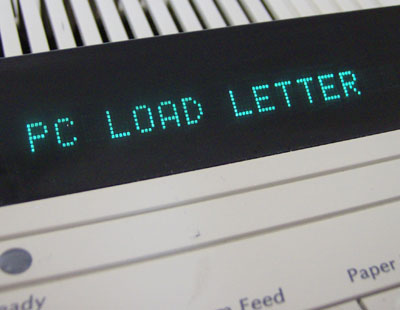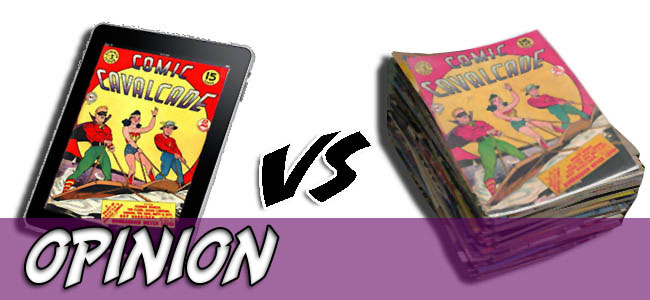Or – “That Univac Thing Is Just A Passing Fad, I Tellya!”
It has become a running gag on the Major Spoilers podcast that “Stephen has an iPad!” and thus loves the futuristic glow of his digital comics, while Matthew is a neo-luddite stuck haunting the back issue bins of musty-smelling dollar stores in search of a vintage first appearance of Betty Cooper. Some have accused me of being a rigid old man, afraid of change and while there may be some validity to that claim, I firmly believe that while digital versions certainly aren’t going away, they will NEVER supersede the paper-and-ink comic book experience…
In the interests of full disclosure, I should note that I do buy and read digital comics, though nowhere near the number of actual physical paper-bound comic books in my collection, and that I admit that the things do have their positives. If you’re looking to read an extensive run of a long-running title, for instance, digital copies have the strength of convenience on their side. Digital comics give you the ability to read a book whose price point or rarity places it out of your range of availability. (You don’t know how I wish I had started with a complete digital set of Legion appearances when I set out on the Hero History project so many months ago…) Most of us won’t ever get our hands on an Amazing Fantasy #15, or the pulped-in-America Elseworlds 80-Page Giant in any other format. My point is not that digital comics are bad, nor am I afraid to read them, but simply that they are, to my experience, an inferior and categorically separate experience to what you experience with an actual, tangible comic book. Why, you ask? Read on, Faithful Spoilerite…
 Problem The First: File Incompatibility
Problem The First: File Incompatibility
My spiffy new laptop has dozens of helpful little programs pre-loaded on it, but a great frustration for me in my digital comic reading comes from the fact that I have had to load no fewer than FOUR different programs specifically for the reading of digital comics. Some filetypes won’t open in my preferred program, while others require the use of the bulky application that I hate. Some publishers are exclusive with one online service, while others seem to be formatted solely for specific devices (like Stephen’s iPad) and still others don’t seem to be compatible with much of anything. Most digital comics reading experiences begin with endless futzing around to find the proper size and settings to view the story I’ve chosen to read, a problem that never occurs while reading actual comics. I have actually read some comic books written in languages that I don’t UNDERSTAND and had a simpler reading experience than with digital comics…
 Problem The Second: Translation Issues
Problem The Second: Translation Issues
Speaking of language, there is a very specific storytelling shorthand that has evolved over decades of comics fare, a language of panels and gutters that sprung out of the folded pamphlet format. Web-comics have taken these tools of the trade and made subtle mutations in them, but digital comics have yet to successfully do so. My single iPad comic book experience was marred by the program trying to read the comic FOR me, moving from panel to panel and providing transitions that were, presumably, designed to enhance the reading experience. With a digital comic, the urge to add cinematics, sound, and other “enhancing” features is always there, making the comic book more like a cartoon. If there’s one thing that those gawdawful motion comics have proven, it’s that there is NO SUCH THING as a motion comic. Adding shiny gewgaws that read the book for me or “improve” the comic book experience simply turns comics into cheapjack movies, doing a disservice to both art forms.
 Problem The Third: Nothing To Show For It
Problem The Third: Nothing To Show For It
More damning that the first two points, though, comes the inevitable question of commerce. If I were to go to a traditional outlet and purchase a specific comic (let’s say, Amazing Spider-Man #41, first appearance of the Rhino, currently available at Gatekeeper Hobbies, Huntoon & Gage, Topeka!) I will walk away with a physical, tangible piece of merchandise. If I purchase the same issue through Marvel’s online comics app, I have a small file on my SD card or portable drive. Certainly, physical damage is a possibility with my Spider-Man comic as well, but I can tell you from experience that I have accidentally deleted, corrupted, or had the computer unexpectedly eat many more files than I have ever damaged comic books. Even if the purchase price of the item is less, as many digital comics are, you do not actually OWN the work. You own a computer program that represents a digital copy of that work. In ten years, as formats and e-readers change, the odds are quite good that you’ll have to re-purchase a new digital copy in order to actually enjoy that story again.
 Problem The Fourth: Money, That’s What They Want
Problem The Fourth: Money, That’s What They Want
Which leads us to another problem: The difficult question of monetization of digital media. I will not argue against the belief that the comic industry distribution system is broken, but moving to a purely digital model raises new ways to make things more complicated. Some believe that a digital comic should “expire” after a certain number of readings, requiring you to pay AGAIN if you want to read it after that initial license. Others believe that the only option to keep up profit margins is to price the digital book exactly the way we’ve been pricing the physical paper comics. Either option is undesirable to me. If I can buy a digital copy for the same price as the paper copy, I will purchase the actual magazine every time, because the reality of it’s physical presence feels like a better investment (if there is such a thing in comic collecting) in the long term. I can read that comic as many or as few times as I like without having to enter my credit card information or send an additional payment to DC’s accounts payable department.
What’s Missing? A Visceral Enjoyment…
There is a simple fact of comic book reading and collecting for me: The books themselves MATTER. My Sunday job consists mostly of processing hundreds of comics of all vintages and sizes per week, and the process of assessing the paper, grading the book, placing it in the protective sleeve and sealing it is a very calming one for me. Recently, we came into possession of a large run of Detective Comics from the 1960’s and 70’s, and I had a sudden realization that spurred this entire train of thought: The comics held no personal value for me, and weren’t books that I wanted for my collection. I have no particular affection for Batman, for the artwork of Carmine Infantino (a fine artist, but not one of my fave-raves) or even for the Go-Go checks on the cover. Despite all of that, seeing these books was a wonderful, fascinating, entertaining experience. Being able to see, to touch, to smell the gently rotting paper, is the basis of why these initially disposable fictions have turned into a cottage industry of their own. That group of comics older than me, books that spent a decade in someone’s damp garage, brought with them a sense of wonder and the hint of journeys unimaginable, springing from the pens of men long dead and entertaining children who are long since grown into probably-boring adults with thankless corporate dead-end jobs.
The reason why I don’t believe that digital media can ever completely replace the booklets that we all argue, obsess, and snark about is that comic books are more than just the sum of their parts. Spider-Man #123 is does not command higher prices because it has a higher or lower print run that #122 or 124, it commands higher prices because it struck a chord with the readers of nineteen-seventy-whatever when they bought it off the rack at Kresge’s or 7-11. The reading and enjoyment of comics requires you to buy into the experience, to judge how much time takes place in between panels, to physically turn the pages to the double-page spread, to take the time to mechanically process and emotionally digest each panel in turn as you go. At the risk of sounding like the crazy old coot who believes that your cell phone is controlling your mind, you cannot translate that same experience into a moving slideshow on your iPad or smartphone.
No matter how shiny the resolution, no matter how many bells, whistles and terrible voice-overs they add (and trust me, Marvel’s digital output proves that there will be all three) they will never be able to replicate the true, fully engrossing comic book experience with any touch-screen. What was initially designed as a compromise to work around the lack of motion and sound has evolved into a specific art-form. Like a microwave dinner, like Dylan going electric, like a folding bicycle, the very nature of a comic “book” made of pixels and bytes is transitory, and while I admit that the digital versions are here to stay, they are not and simply CANNOT be an adequate replacement for what came before. Call me old, if you like, but digital comics are an offshoot of that artform, a variation on existing themes that can never fully replace the real thing.





19 Comments
I totally agree with you.
In this day and age, where computer technology advances so rapidly, it’s so easy to lose either the file for the comic, or the program to view it. And what happens if, let’s say, Mokin Comics decides to put out a comic using their own viewer for it, but a year later, they go bankrupt; the computer of our dear friend Matthew crashes (severe crash and burn…)…he buys a new one but cannot get back the viewer. Seems he’s lost his digital comics. I know the Interweb can be usueful, but it could happen.
I know my house could burn down, taking away my 10k + comics, but that, I think, has less of a chance to happen. Maybe. I know I destroy/lose/erase more files than I do comics.
That is Mokin’s opinion.
I agree. Let me explain. No, not enough time. Let me sum up. I also prefer hardbacks to paperbacks. And actual books (non-comic) to Kindle/Nook/Ebook. However ease-of-transport is an issue. I will always by the hardback for Jordan/Sanderson and GRRM (fantasy novels) but if I’m trying something out (Rothfuss) e-book is great. The same is true of comics. I’ll buy the trades of Atomic Robo and Locke and Key, but a digital version of old stuff is EASY. Not as satisfying, but easy. Right now I get the best of both worlds and can minimize physical occupancy of my geek habits.
(Did I mention I move on average once a year?)
I agree with the moving part. Suffice to say that about 8 years ago, the wife and I bought a house, and I have a big room in the basement for my comics and our books (she’s an historian, and I have a BA in Lit, so we’re both crazy about books in general…).
When we moved to our house, about 80% of all our boxes were comics and books. Had those comics been in digital format, I would’ve moved with 2 pick-up trucks and my car.
…ah well…
…now, I don’t even want to contemplate moving. No way.
And just in case, I’m not against digital comics. As long as it doesn’t kill print.
you didn’t talk about format.
if an author want to do a 20×30 comic, because he feels it’s what it needs, he can. on the digital comic, you are stuck with the size ofthe screen.
no Little Nemo In Slumberland, no Wednesday Comics.
First of all, i like how you name your article “why I prefer print over digital comics” and no “why print is better and you are a bunch of loosers” ‘cos everybody is entitle of his/her own opinion, and on that note “This is why I prefer digital comics over print ones”.
Accessibility.- I live in a dark corner of the world (a small town in Mexico notorious only because this is were salma hayek was born) and the closest comic book shop is about 4 hrs away so having the ability to purchase the comics I want at home is a big plus over print, and even more if I went to the comic shop 6 hrs away they don’t have all the titles (don’t ask us about anything outside marvel and DC at comic emporium Veracruz) or the back issue bin to treasure hunter old vintage comics.
Price.- right now I can go to to the comixology app and purchase the walking dead 82 (date & day) for $3.50 dls, but what if I want the print one? You may ask $5.50 dls sometimes plus shipment, I know I talking about the international market, but if the industry I looking to new reader it’s a big market outside the US.
Compatibility: I know up until now is a mess, for example for some idiotic reason if buy a comic at marvel’s DCU I can’t read it in the marvel’s own ipad app, but give it time I remember when I couldn’t watch my betamax on my VHS player or couldn’t listen my realaudio files on my Sony walkman, I guess we will eventuality settle on a format.
Gimmicky enhancement: well this boils down to the reader, I personally like the way comixology deals hit this, what I do is read page by page and in my 2nd reading use the auto panel fly thingy to focus on the details in the background and enjoy the art.
There are more reasons why a prefer digital but I guess those are the main ones, I would also like to put my 2 cnts on the “save the industry” topic, current ongoing series printed on pulpy cheap paper for $1, date & day releases on Digital format, trades on glossy expensive paper and if the comic is worth it an expensive beautiful hard cover. On the other hand I do enjoy my old comics and theres a special place in my home and my heart for the mexican reprint of uncanny x-men #126, the first comic I owned.
First of all, i like how you name your article “why I prefer print over digital comics” and no “why print is better and you are a bunch of loosers” ‘cos everybody is entitle of his/her own opinion, and on that note “This is why I prefer digital comics over print ones”.
Mileage, as always, may vary. :)
Well regardless of whether I agree or disagree with you Mr. Peterson, I just wanted to say that this was one of your best articles. Your writing was very very good. You should squeeze a few extra Luthordollars from the man.
I also see the value of digital works, but prefer paper copies of comics (and books).
I don’t have much insight to offer about my own preference except that it parallels the 1st and 4th arguments above. I’ll happily pay for content in multiple formats if it’s my choice (comics: floppies and collections) but I get slightly resentful if it’s because the mechanism for enjoying it becomes obsolete (e.g. audio: LP, cassette, MP3, etc.).
Great article. Now where are my computer games I used to love. 3.5 or 5.25 inch floppy disc. Oh, here they are. Wait, I no longer have a floppy disc drive.
I’m currently reading a networking book on my netbook, but would much prefer the paper format. I think digital is a great format for reading a large archive such as the Mad Magazine CD and DVD releases several years ago which contained all issues from #1 on. I seem to remember a SpiderMan similar to this. But on a monthly basis, I’d rather have paper.
Very well done.
I have a personal attachment to print myself, but have to admit that it’s primarily a visceral, personal, emotional attachment.
Also, to add to Point the Third, I have a beef with those subscription services where you don’t even download the actual file of the comic–instead simply getting ACCESS to comics. This lack of ownership (even if it’s only ownership of ones and zeroes on a hard drive) aggravates me to no end. Why would I pay you to just LOOK at something?
Yup. Why would anyone pay admission to a museum, just to look at stuff? I have no idea…
I don’t have a valid long standing winded what have you argument. Short and short? I like holding the damn book. Plain and simple.
I am older than Matthew by far – I grew up reading Bill Finger’s Batman if that gives you a clew – and I will admit that I don’t own a Kindle or an I-Pad. If I want to read a book, I want to sit down, with a paper object in my hand, and enjoy the reading experience. I am not a complete ludite, however. I no longer own a stereo, and use I-Tunes on my computer and an I-Pod to enjoy the music experience. This is because digital music makes sense. I no longer have to keep a library of vinyl disks that quickly wear out, which rivals my comic collection in size, just to deliver musical tones to my ears. Comic and books are a completely different thing. Ink on paper is still the most effective way of delivering words and pictures to my eyeballs. I reread certain books or comics every few years, sometimes only once a decade or so. The problem I see with e-books or e-comics is that you have to drag a reader around with you and if I go to try to reread my e-book ten years from now, I’ll need to find a piece of software to convert the viewer into a format that can be used by whatever we will be using for readers or computers ten years from now. Either that or the battery for my antique reader will no longer be available. Besides, in the event of a nearby nuclear blast, all those layers of comics and books against my wall are GREAT insulation! Just kidding.
Digital = convenievce
Print = reliving the experience of being 10 yrs old laying in the grass in july ‘living the dream’.
To me each printed panel, with it’s out of register colors, dot patterns bleeding together on
‘off-white to cream colored’ paper are like modern fine art prints. ..and that smell!
As a 58 yr old (FF #10 got me hooked) i feel that digital is fine for modern stuff; but for my money, just buy some cheap copies of Marvel Collectors Item Classics or the like.
Matthew, Nail => Head.
Great article Matthew. As for your first problem, I would love to see all digital comics be readable in CDisplay. I think think it’s the best for reading comic books that there is.
I have to wonder why it has to be one way or the other. Why can’t we go with a hybrid model with a mix of both print and digital reading material? I find myself, as we move into the post-paper era, buying print copies of the material that is most important to me (e.g. the latest Dresden Files book or a good run of Charles Vess or T. McFarlane books) and digital copies of material that I want to read but suspect I won’t revisit or don’t really want occupying a box in my basement. Additionally, there’s a good amount of material out there (fiction/nonfiction/comic/etc) that I think was complete crap (to me) upon finishing.
Granted the distribution methods are a complete disaster and pricing is definitely not where it should be (buying a book from Amazon now costs the same as the physical edition, thanks for that one Apple and I think the 30% cut Apple wants for reading material on their devices is robbery) but I really love the idea of having all of my reading material on my iphone and my absolute favorite material up on my bookshelf. Given that though, I think we are moving towards a paperless future (look at Borders). Ultimately, I think we will all probably have those personal projection devices that they had in Wall-E, along with the “Little Rascal” scooters.
Great job Matthew! I’ve been of the same viewpoint since digital comics came out and really started getting rammed down my throat. I understand the benefits to digital comics, and they’re a fine media for those who want it, and I use it occasionally but it’s just not for me. I like having that book in my hand, even if it’s a book like Animal Man #11 I got at the local crappy book store that was only 0.35 cents, there’s something valuable to me about that. I take care of it no less than I would over a $50.00 comic.
If I wanted to read Atomic Comics #1, currently abou $1800.00, I could maybe convince the local guy to let me see his without buying it (which I doubt he’d let me do), or maybe I could get a digital copy and see it there. Or if I’m interested in something like Haunt, but I’ve never read it before and don’t know whether I’ll like it, I will check it out in digital and then buy it in print if I really enjoyed it. I did that very method when I came across Locke and Key (due to this site).
I just know that I have value, a real transferable value, with physical print material. I can take my books to the ebay or the local LCS, or even a garage sale, and I can make some kind of currency off my items. Maybe not much, but something. Unless in the far flung future, people are selling old salvaged USB jumpdrives or SD cards as antiques, the digital file has no real value one step down the line. Even less so if you’re working with a subscription service. I would pay to visit the Louvre museum, but I won’t make repeated payments just to see it on TV.
I think this is all well said and approached in about the perfect way. Both methods have their Merits. The convenience and accessibility of Digital comics should be a boon for the industry. At the same time digital versions can never replace hard copies completely for me. For all the reasons you stated, Matthew.
Of course it doesn’t help that my experiences with the One digital comics app I tried on my phone (It has comics from the big two and more on it) were unimpressive to say the least. It takes longer to load a single comic than it does to load entire new apps on my phone and it doesn’t seem to store them on the unit.